Introduction
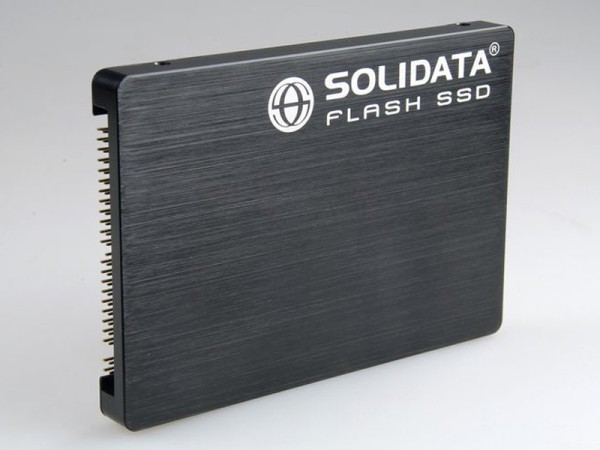
When Jason at DVNation contacted me about reviewing their new Solidata RAIDPak Internal Storage Solution that houses four 2.5 inch Solidata X2 Series solid state drives, I took a brief look at the specs and asked him to ship it over. Later that evening I had a flash go through my mind, kind of like when someone mentions a name and a few hours later the face flashes across your internal screen and you blurt out, "yeah...I know that person". This wasn't a flash of a face; it was a statement printed on DVNation's website for the individual offering of the Solidata X2 Series; faster than the Intel X25-M MLC SSD.
At Storage Visions, the pre-CES show for everything regarding data retention, I spoke with many SSD manufacturers and asked them when they would have a product on the market that could compete with Intel's X-25M. Just as quickly as the question came out, their expressions looked like the people you see flying out of Vegas as you are flying in. For most the answer was a year or so down the line when they would be ready to compete with the X Series Intel products. A few others chimed in with the old "If You Can't Beat Them, Join Them". These manufacturers will just be taking the Intel products and re-badging them to have their company name somewhere on the drive.
Solidata took a different approach. They didn't want anything to do with just rebranding an Intel drive and were determined to make a run at the new king of the MLC throne. With hard work and a great product development team, they may have just leaped over the X25-M with their new X2 Series products.
Today we are going to take a look at the Solidata X2-128, a 128GB MLC solid state drive that was provided to use by DVNation, the leading source for all of your SSD needs. Let's now take a look and see what this new cutting edge drive is all about.
Specifications, Availability and Pricing
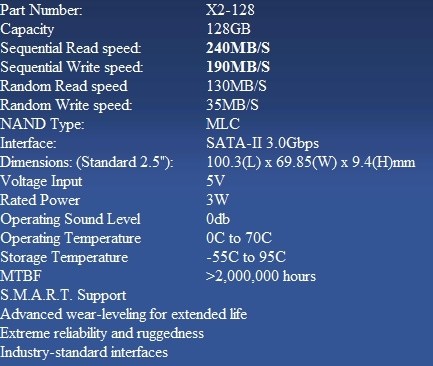
The big standout on the specifications page is the massive read and write speeds. In ATTO we actually achieved a faster write speed than what Solidata claims. It is rare to see a company go conservative with their claimed performance, but we have seen write speeds of up to 212 MB/s. ATTO is a benchmark that we test with, but we rarely publish data from this test, since it often doesn't relate to real world performance.
The rest of the specifications are just common ground for SSDs; a wide range of operating temperatures, high transfer speeds and lots of goodies to keep your drive working for many years to come. One specification that did surprise us was the amount of power drawn. I didn't pick up on this at first until I unplugged the drive from one machine right after a benchmark run. The drive was hot, like Raptor 150GB hot. The Solidata X2-128 uses up to 3 watts; other SSDs have the same rating but I have never felt an SSD get this warm before. Later this week we will test the X2-256 and see if this thermal condition is just an issue with the 128GB drive or if it falls across the entire X2 Series product range.
DVNation currently stocks a wide range of Solidata products. They list the 128GB X2 for 665.00 USD. Newegg lists the Intel X25-M 160GB drive, the closest competitor of the Solidata X2-126GB, for 759 USD. In my opinion both drives are priced out of the reach of the general consumer, but then again, both drives are marketed towards enterprise users and enthusiasts.
The Packaging
Solidata has a nifty little box for their products. They are not too retail friendly; but then again, I doubt you will ever see the X2 Series sitting on the shelf anywhere due to the cost of ownership.
Here we see the back of the package, no specifications or other information of interest to you guys.
With the outer box removed we see that the drive sits inside of the inner box and has protection all the way around the drive.
The Solidata X2-128 SSD
The Solidata X2 Series drives are housed in an aluminum casing that is brushed and then anodized.
The back of the drive carries the label with the model and serial information.
As you can see, the side of the drive is typical of the 2.5-inch SSDs.
The data and power connectors are in the correct place.
Test System Setup
Test System
Processors: AMD Opteron 2356 (2.3GHz Quad-Core) x2
Motherboard: Tyan S2915-E (Supplied by Tyan)
Memory: Kingston KVR667D2S4P5/2G x4 (Supplied by Kingston)
Graphics Card: XFX 8800 GTX (Supplied by XFX USA)
Enclosure: Lian Li V2000
Cooling: Noctua NH-U12DO (Supplied by Noctua)
SATA Controller: Areca ARC-1231ML (Supplied by Areca)
SAS Controller: Areca ARC-1680i (Supplied by Areca)
Operating System: Microsoft Windows Vista Ultimate X64
Today we are comparing the Solidata X2-128 SSD with other 2.5-inch drives that we've reviewed in the past.
All of the drives tested were performed on the listed system under identical conditions to ensure true apples to apples performance results for comparison.
Benchmarks - HD Tune Pro
HD Tune Pro
Version and / or Patch Used: 3.00
Developer Homepage: http://www.efdsoftware.com
Product Homepage: http://www.hdtune.com
HD Tune is a Hard Disk utility which has the following functions:
Benchmark: measures the performance
Info: shows detailed information
Health: checks the health status by using SMART
Error Scan: scans the surface for errors
Temperature display
HD Tune Pro gives us accurate read, write and access time results and for the last couple of years has been gaining popularity amongst reviewers. It is now considered a must have application for storage device testing.
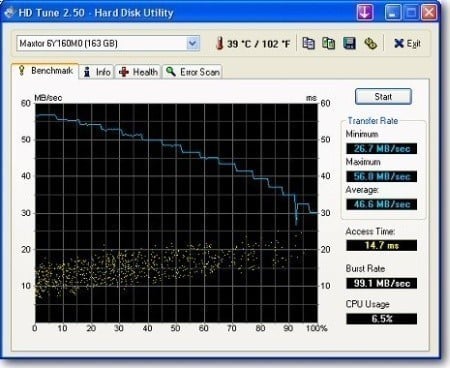
Read Tests
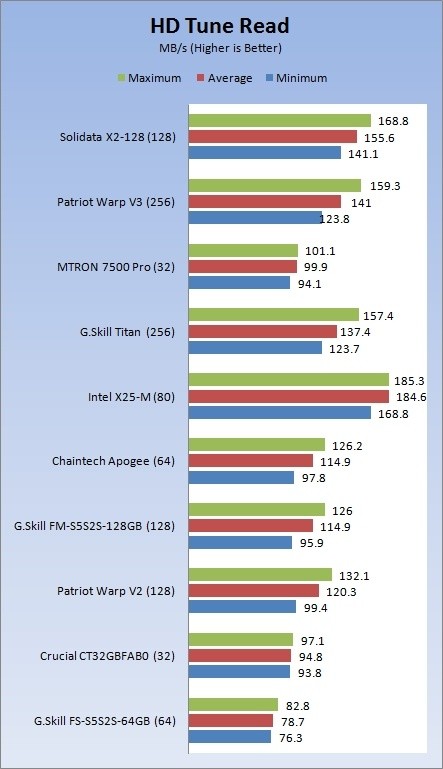
Our synthetic STR test shows that the Solidata X2-128 lags behind the Intel X25-M by a small margin, but it is still the second fastest SSD we have tested to date.
Write Tests
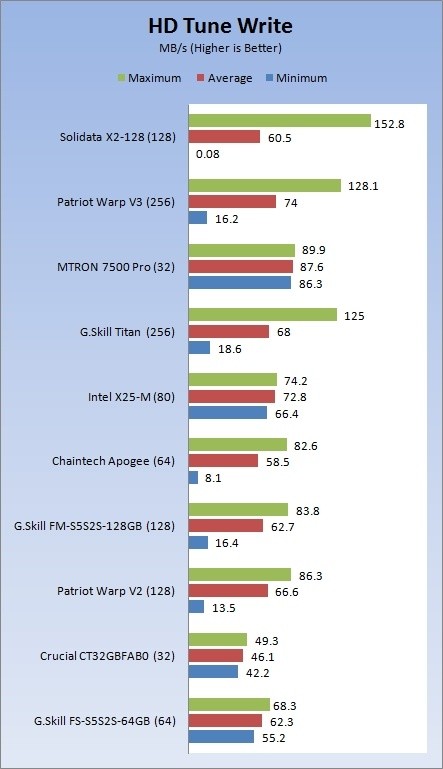
The Solidata X2-128 achieved the fastest write maximum we have ever seen in a SATA based drive ever. After 20% of the test, the drive starts to trail off. Here you can see where the minimum score really hurts the drives average score.
Benchmarks - EVEREST Random Access Time
EVEREST Random Access Time
Version and / or Patch Used: 4.60
Developer Homepage: http://www.lavalys.com
Product Homepage: http://www.lavalys.com
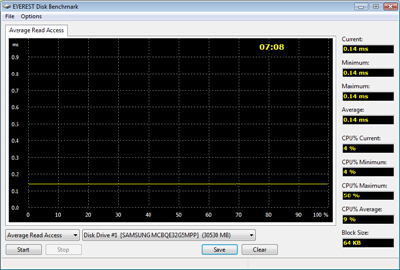
Everest Ultimate and Corporate Edition offer several different benchmarks for testing and optimizing your system or network. The Random Access test is one of very few if not only that will measure hard drives random access times in hundredths of milliseconds as oppose to tens of milliseconds.
Read Tests
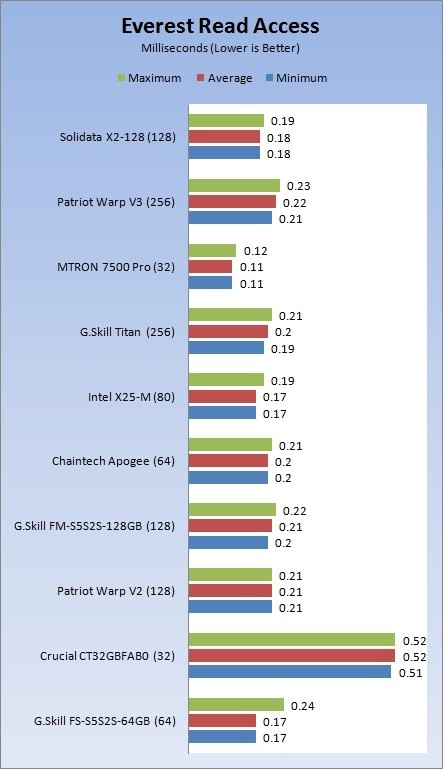
Access times is where SSDs really show their might and here we see that the sample drive is able to keep up with the other drives; even out-performing several of the others.
Write Tests
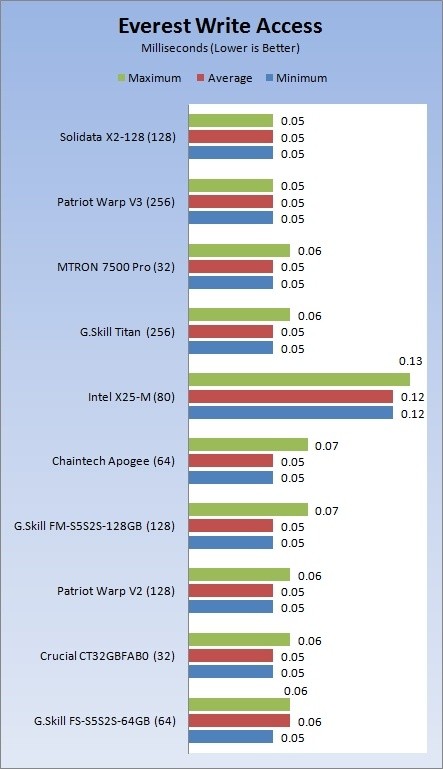
The Solidata X2-128 shows strong performance in the write access test.
Let's see how all of these synthetic benchmarks relate to real world applications.
Benchmarks - PCMark Vantage Hard Disk Tests
PCMark Vantage - Hard Disk Tests
Version and / or Patch Used: 1.0.0
Developer Homepage: http://www.futuremark.com
Product Homepage: http://www.futuremark.com/benchmarks/pcmark-vantage/
Buy It Here

PCMark Vantage is the first objective hardware performance benchmark for PCs running 32 and 64 bit versions of Microsoft Windows Vista. PCMark Vantage is perfectly suited for benchmarking any type of Microsoft Windows Vista PC from multimedia home entertainment systems and laptops to dedicated workstations and high-end gaming rigs. Regardless of whether the benchmarker is an artist or an IT Professional, PCMark Vantage shows the user where their system soars or falls flat, and how to get the most performance possible out of their hardware. PCMark Vantage is easy enough for even the most casual enthusiast to use yet supports in-depth, professional industry grade testing.
FutureMark has developed a good set of hard disk tests for their PCMark Vantage Suite. These tests are based on real world applications that many of us use daily.
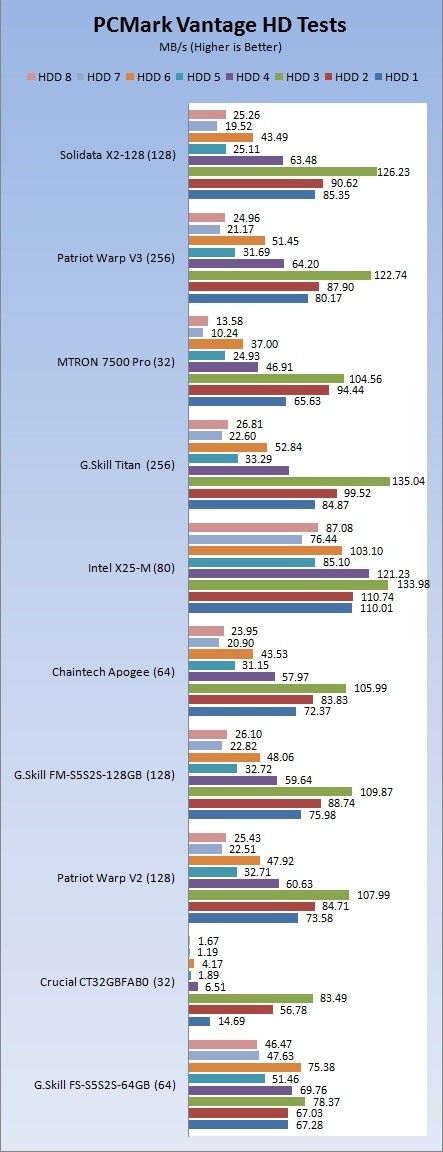
HDD1 - Windows Defender
HDD2 - Gaming
HDD3 - Windows Photo Gallery
HDD4 - Vista Startup
HDD5 - Windows Movie Maker
HDD6 - Windows Media Center
HDD7 - Windows Media Player
HDD8 - Application Loading
On the desktop side it comes down to this. I had such high hopes for the Solidata X2-128, but it just couldn't deliver the goods against the X25-M.
Benchmarks - Passmark
Passmark Advanced Multi-User Tests
Version and / or Patch Used: 6.1
Developer Homepage: http://www.passmark.com
Test Homepage: http://www.passmark.com
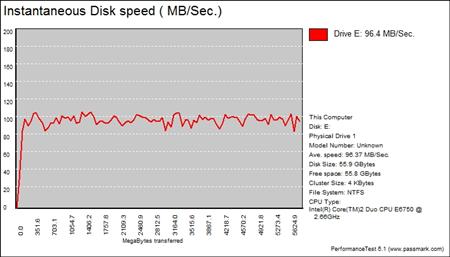
Many users complain that I/O Meter is too complicated of a benchmark to replicate results so my quest to find an alternative was started. Passmark has added several multi-user tests that measure a hard drives ability to operate in a multi-user environment.

The tests use different settings to mimic basic multi-user operations as they would play out on your server. Variances is read / write percentage as well as random / sequential reads are common in certain applications, Web Servers read nearly 100% of the time while Database Servers write a small amount of data.
The Workstation test is the only single user environment and will be similar to how you use your system at home.
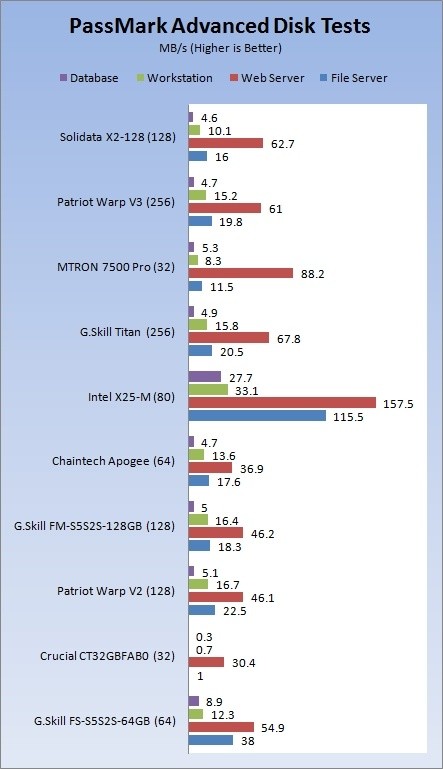
Here we see the workstation and server tests and once again the Solidata X2-128 performs well, but is unable to outperform the X25-M as we were hoping to see.
Final Thoughts
Intel killer - the Solidata X2-128 is not, but it is still a hell of a drive. The problem is that we have other drives that we have looked at in recent weeks perform at the same level of the X2-128, but come in at a lower and sometimes much lower cost.
All is not lost for the Solidata X2 Series. We have the X2-256 in house and the early benchmark numbers show that it is a much stronger performer than the X2-128. The X2 Series drives are designed to work in a RAID configuration for enterprise users and because of that there are certain optimizations at work. Luckily we were able to get our hands on the Solidata RAIDpak and the appropriate Areca RAID controller that really lets the drives breath through the PCIe bus.
I didn't want to finish this article as a preview to another one, but that is really what we're left with. The X2-128 didn't live up to what we were expecting, but knowing that the X2-256 performs much better leaves us wanting to get the cat out of the bag much sooner.

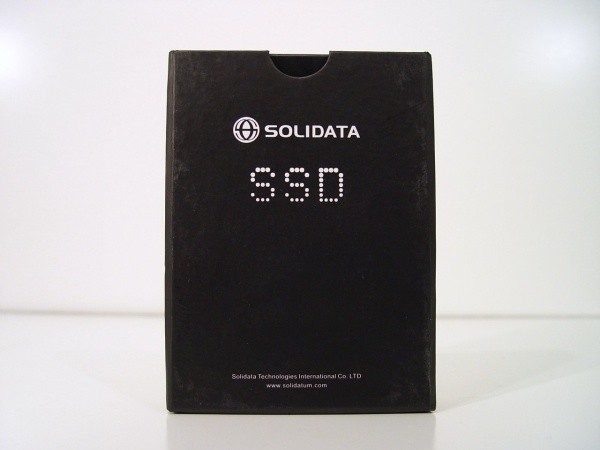
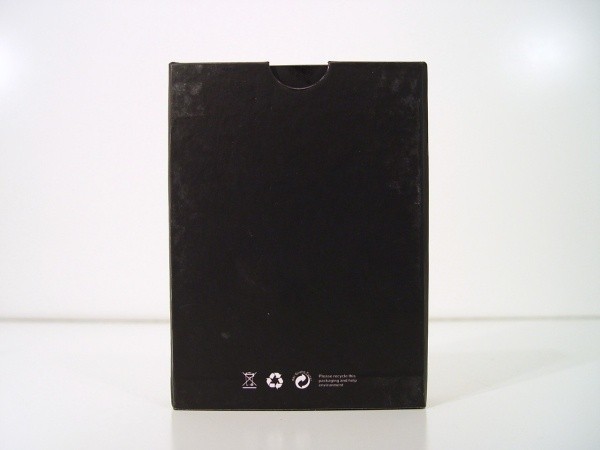
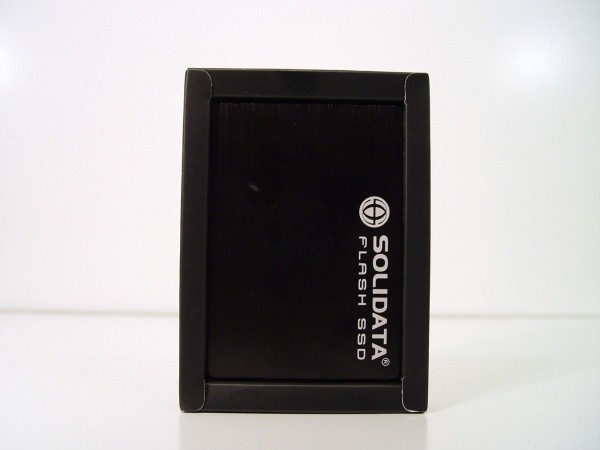
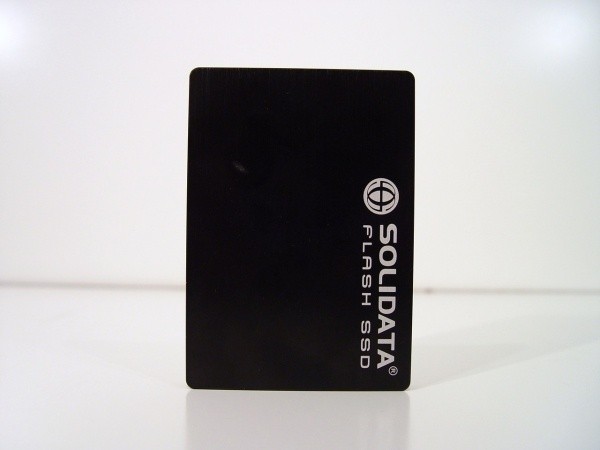
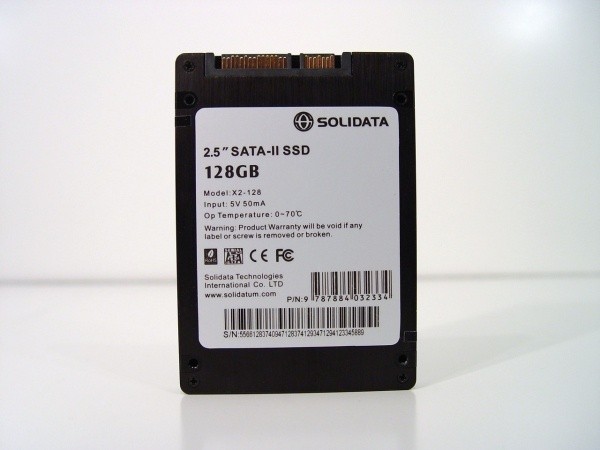
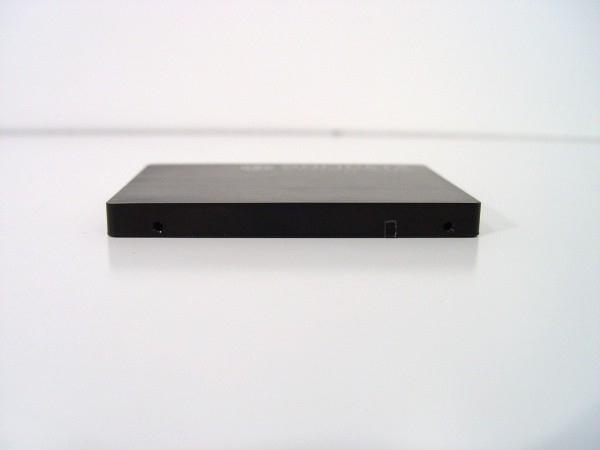
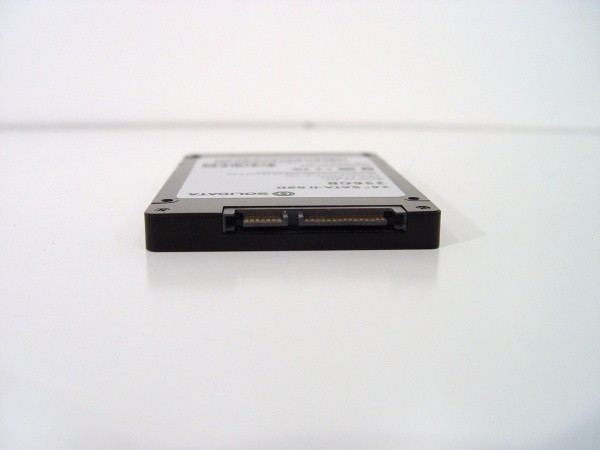
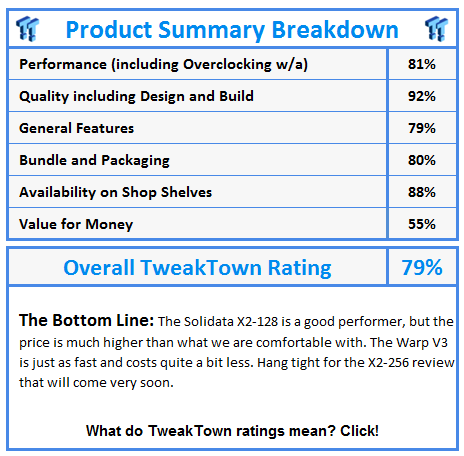
 United
States: Find other tech and computer products like this
over at
United
States: Find other tech and computer products like this
over at  United
Kingdom: Find other tech and computer products like this
over at
United
Kingdom: Find other tech and computer products like this
over at  Australia:
Find other tech and computer products like this over at
Australia:
Find other tech and computer products like this over at  Canada:
Find other tech and computer products like this over at
Canada:
Find other tech and computer products like this over at  Deutschland:
Finde andere Technik- und Computerprodukte wie dieses auf
Deutschland:
Finde andere Technik- und Computerprodukte wie dieses auf